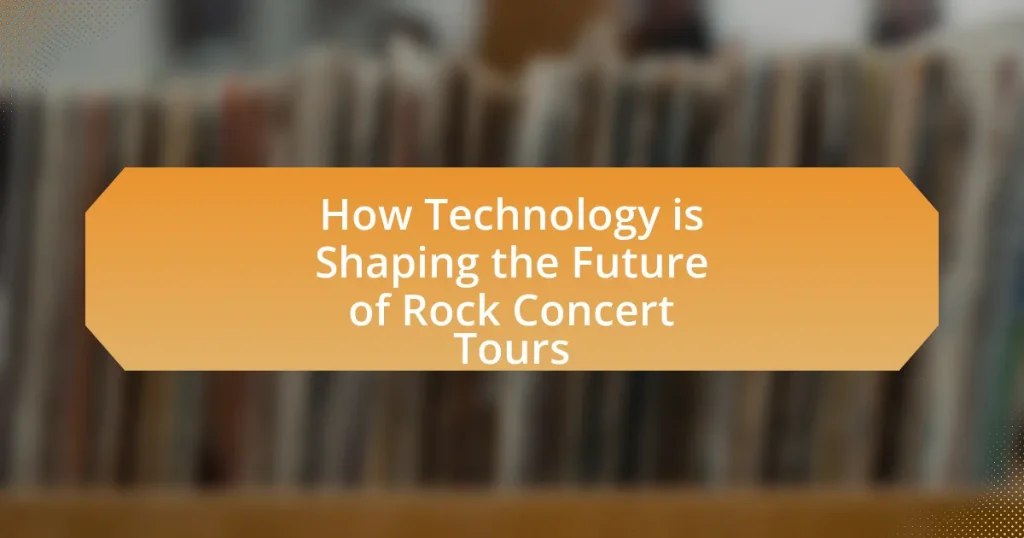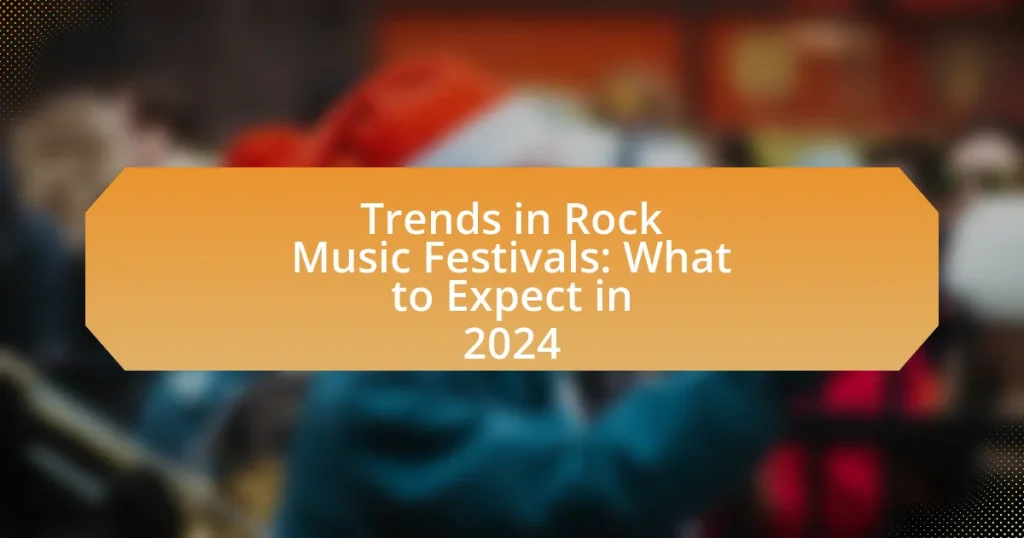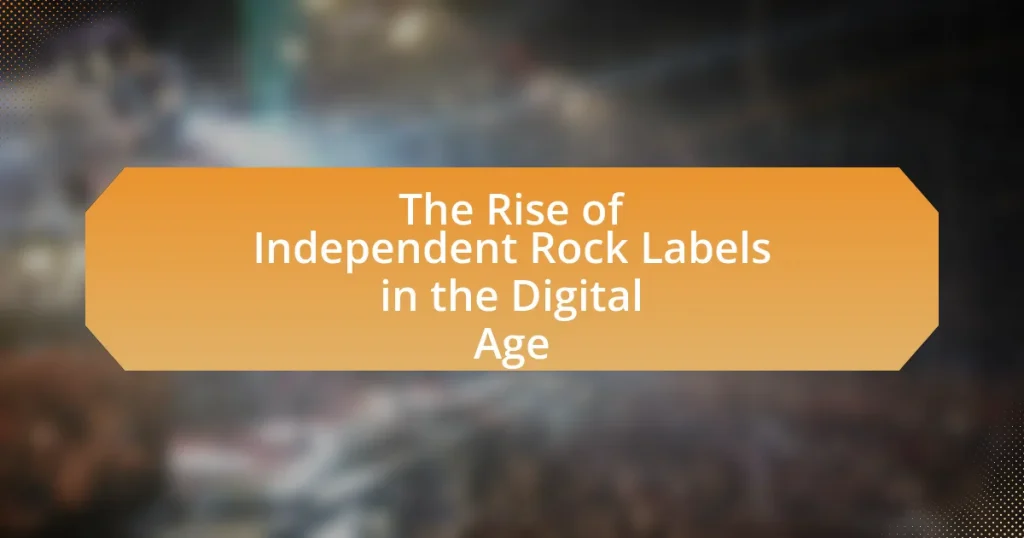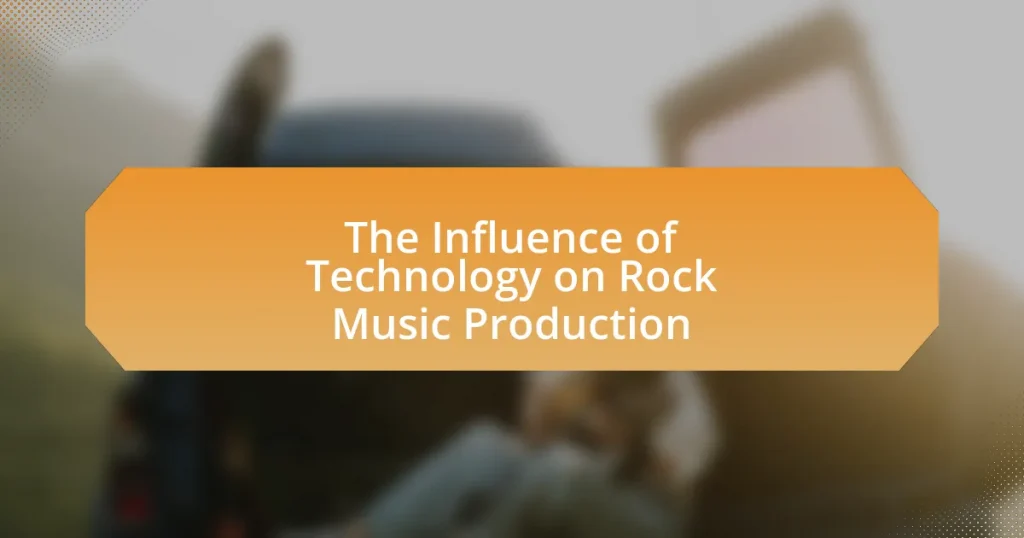The article focuses on how technology is shaping the future of rock concert tours, highlighting advancements in sound systems, lighting, and audience engagement tools. It discusses the impact of augmented reality, virtual reality, and data analytics on enhancing live experiences and personalizing fan interactions. Additionally, the article addresses the challenges posed by technology, including security concerns and technical failures, while emphasizing the importance of integrating innovative solutions to improve concert experiences. Key trends such as the rise of streaming services and mobile technology are also examined, showcasing their influence on ticket sales and audience participation.
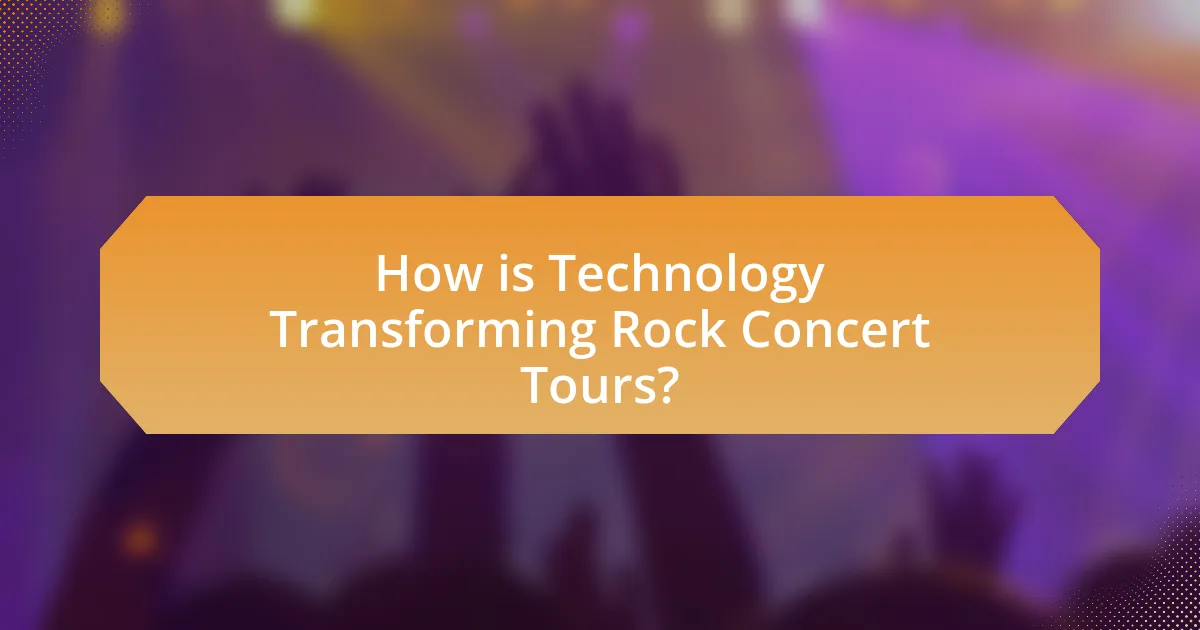
How is Technology Transforming Rock Concert Tours?
Technology is transforming rock concert tours by enhancing live experiences through advanced sound systems, immersive visuals, and interactive fan engagement. Innovations such as high-definition LED screens and sophisticated audio technology create a more dynamic atmosphere, allowing artists to deliver captivating performances. Additionally, virtual reality and augmented reality applications enable fans to experience concerts in new ways, such as through virtual front-row seats or interactive backstage tours. Data analytics and mobile apps also facilitate personalized experiences, allowing fans to receive tailored content and updates. According to a report by PwC, the global live music market is expected to grow significantly, driven by these technological advancements, indicating that technology is not only enhancing the concert experience but also shaping the future of rock tours.
What technological advancements are influencing rock concert tours?
Technological advancements such as advanced sound systems, high-definition video displays, and augmented reality are significantly influencing rock concert tours. These innovations enhance the overall concert experience by providing superior audio quality, immersive visuals, and interactive elements that engage audiences. For instance, the use of line array speakers allows for clearer sound distribution across large venues, while LED screens and projection mapping create dynamic visual backdrops. Additionally, augmented reality applications enable fans to interact with the performance in real-time, enriching their engagement. These advancements not only improve the quality of live performances but also attract larger audiences, as evidenced by the increasing investment in technology by major touring acts.
How are sound and lighting technologies evolving for live performances?
Sound and lighting technologies for live performances are evolving through advancements in digital audio processing, immersive sound systems, and intelligent lighting solutions. Digital audio processing allows for higher fidelity sound and real-time manipulation of audio, enhancing the overall listening experience. Immersive sound systems, such as spatial audio setups, create a three-dimensional sound environment, making performances more engaging. Intelligent lighting solutions, including LED technology and automated lighting systems, enable dynamic visual effects that synchronize with music, enhancing the emotional impact of live shows. These innovations are supported by industry trends, such as the increasing use of augmented reality and virtual reality in performances, which further enrich the audience experience.
What role does stage design technology play in enhancing audience experience?
Stage design technology significantly enhances audience experience by creating immersive environments that engage multiple senses. Advanced lighting systems, high-definition video displays, and interactive elements allow for dynamic storytelling and emotional connection during performances. For instance, the use of LED screens can transform a simple stage into a vibrant visual landscape, while synchronized lighting can evoke specific moods, enhancing the overall atmosphere. Research indicates that audiences are more likely to remember and enjoy performances that utilize innovative stage design, as it fosters a deeper emotional response and a sense of participation in the event.
Why is technology essential for modern rock concert tours?
Technology is essential for modern rock concert tours because it enhances the overall experience for both artists and audiences. Advanced sound systems ensure high-quality audio, while sophisticated lighting and visual effects create immersive environments that engage fans. Additionally, technology facilitates live streaming and virtual reality experiences, allowing broader access to concerts beyond physical attendance. According to a report by the International Live Music Conference, the integration of technology in live performances has increased audience engagement by over 30%, demonstrating its critical role in the evolution of concert experiences.
How does technology improve safety and security at concerts?
Technology improves safety and security at concerts through advanced surveillance systems, crowd management tools, and communication technologies. Surveillance cameras equipped with facial recognition software can identify potential threats in real-time, enhancing the ability of security personnel to respond swiftly. Additionally, crowd management technologies, such as mobile apps that provide real-time updates on crowd density and emergency alerts, help in maintaining order and ensuring the safety of attendees. Furthermore, communication technologies enable seamless coordination among security teams, allowing for rapid response to incidents. These technological advancements have been shown to reduce incidents of violence and improve overall safety at large events, as evidenced by studies indicating a decrease in security breaches at venues that implement such systems.
What impact does technology have on ticket sales and audience engagement?
Technology significantly enhances ticket sales and audience engagement by streamlining the purchasing process and creating interactive experiences. Online platforms and mobile applications allow fans to buy tickets instantly, increasing accessibility and convenience, which has led to a reported 20% increase in ticket sales for major events. Additionally, technologies such as social media, augmented reality, and live streaming foster deeper connections between artists and fans, enhancing engagement. For instance, a study by Eventbrite found that events utilizing social media marketing saw a 30% higher attendance rate, demonstrating the effectiveness of technology in driving audience participation.
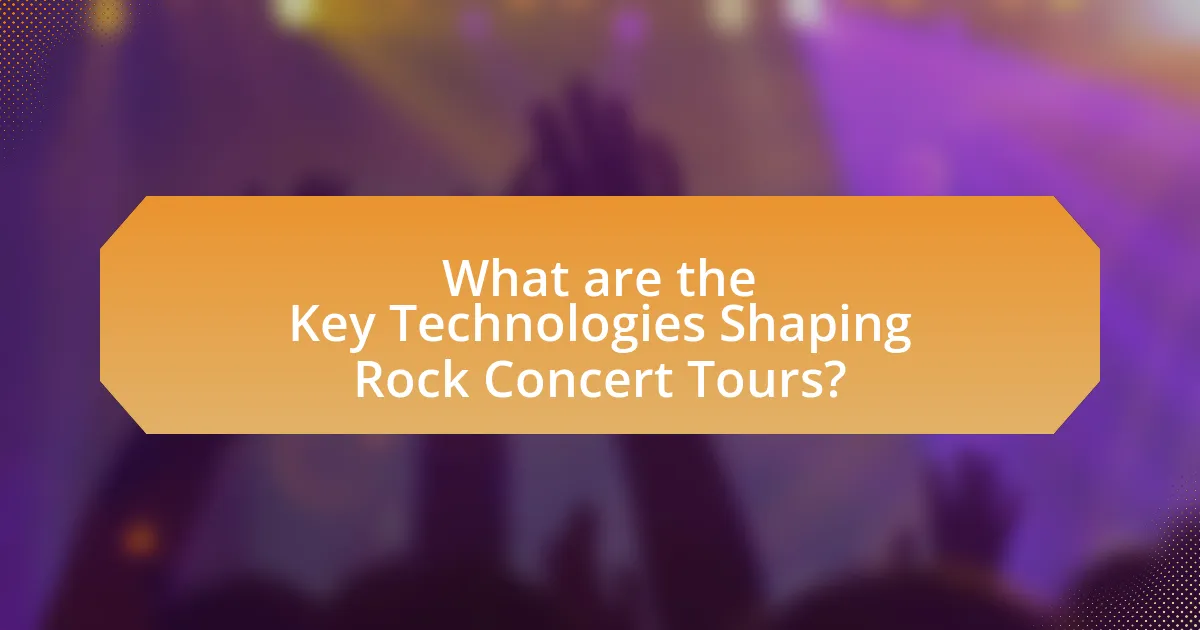
What are the Key Technologies Shaping Rock Concert Tours?
Key technologies shaping rock concert tours include advanced sound systems, high-definition video displays, and immersive lighting technologies. These innovations enhance the overall concert experience by providing superior audio quality, stunning visual effects, and engaging environments. For instance, line array speakers deliver clear sound across large venues, while LED screens enable dynamic visuals that captivate audiences. Additionally, technologies like augmented reality and virtual reality are increasingly being integrated into performances, allowing fans to experience concerts in new and interactive ways. The adoption of these technologies is supported by industry trends, such as the growing demand for high-quality live entertainment and the increasing use of data analytics to optimize tour logistics and audience engagement.
How are streaming services changing the landscape of live music?
Streaming services are transforming the landscape of live music by providing artists with new platforms to reach audiences and monetize performances. These services, such as Spotify and Apple Music, enable musicians to live-stream concerts to global audiences, breaking geographical barriers and allowing fans to experience live music from the comfort of their homes. According to a report by the International Federation of the Phonographic Industry (IFPI), 2021 saw a significant increase in live-streamed events, with over 50% of music fans participating in virtual concerts. This shift not only expands the audience base for artists but also creates new revenue streams through ticket sales and merchandise linked to live-streamed events.
What benefits do virtual concerts offer to artists and fans?
Virtual concerts provide significant benefits to both artists and fans by enhancing accessibility and engagement. For artists, virtual concerts eliminate geographical barriers, allowing them to reach a global audience without the logistical challenges of physical tours. This can lead to increased revenue through ticket sales and merchandise, as evidenced by the $2.1 billion generated by virtual concerts in 2020 alone. For fans, virtual concerts offer the convenience of enjoying live performances from the comfort of their homes, often at a lower cost than traditional concerts. Additionally, fans can interact with artists through live chats and social media, fostering a sense of community and connection that enhances the overall experience.
How does augmented reality enhance the concert experience?
Augmented reality enhances the concert experience by providing immersive visual effects and interactive elements that engage the audience more deeply. This technology allows fans to see digital overlays of visuals, such as animations or additional information about the performance, directly through their devices or AR glasses. For instance, during live performances, artists can project 3D holograms or visual effects that synchronize with the music, creating a multi-sensory experience. Research indicates that concerts utilizing AR can increase audience engagement by up to 30%, as fans interact with the content in real-time, enhancing their emotional connection to the performance.
What innovations in mobile technology are affecting concert attendance?
Innovations in mobile technology significantly affect concert attendance by enhancing ticket purchasing, improving event engagement, and facilitating social sharing. Mobile apps allow fans to buy tickets instantly, reducing barriers to attendance; for instance, platforms like Ticketmaster report that mobile ticket sales have increased by over 50% in recent years. Additionally, features such as live streaming and augmented reality experiences enable fans to engage with concerts remotely, broadening access and interest. Social media integration through mobile devices encourages attendees to share their experiences in real-time, which can drive further interest and attendance for future events.
How do mobile apps facilitate fan interaction during concerts?
Mobile apps facilitate fan interaction during concerts by providing real-time communication, interactive features, and personalized experiences. These applications enable fans to engage with artists through live polls, song requests, and social media integration, enhancing the concert experience. For instance, a study by Eventbrite found that 70% of concertgoers prefer using mobile apps for accessing event information and interacting with other fans. Additionally, features like augmented reality and exclusive content can create a more immersive environment, allowing fans to feel more connected to the performance and each other.
What role do social media platforms play in promoting rock tours?
Social media platforms play a crucial role in promoting rock tours by enabling artists to reach a wide audience quickly and effectively. These platforms allow musicians to share tour announcements, engage with fans, and create buzz through targeted advertising. For instance, a study by the Pew Research Center found that 69% of adults in the U.S. use social media, providing a vast potential audience for promotional content. Additionally, platforms like Instagram and Facebook facilitate real-time updates and interactions, which can significantly enhance fan engagement and ticket sales.

What Challenges Does Technology Present for Rock Concert Tours?
Technology presents several challenges for rock concert tours, including high costs, technical failures, and security concerns. The integration of advanced sound and lighting systems requires significant financial investment, which can strain budgets, especially for smaller bands. Additionally, reliance on technology increases the risk of technical failures, such as equipment malfunctions or software glitches, which can disrupt performances. Furthermore, the use of technology for ticketing and crowd management raises security issues, as cyber threats and data breaches can compromise personal information and safety. These challenges necessitate careful planning and resource allocation to ensure successful tours.
What are the potential downsides of relying on technology in live performances?
Relying on technology in live performances can lead to several potential downsides, including technical failures, reduced authenticity, and increased costs. Technical failures, such as equipment malfunctions or software glitches, can disrupt the performance and negatively impact the audience experience, as evidenced by incidents like the 2017 Coachella festival where sound issues affected multiple acts. Reduced authenticity occurs when artists overly depend on technology for vocals or instrumentals, which can diminish the raw, live essence of a performance, as noted by critics who argue that excessive use of backing tracks detracts from the artist’s true talent. Additionally, the increased costs associated with high-tech equipment and maintenance can strain budgets, particularly for smaller venues or independent artists, making it financially challenging to deliver high-quality shows.
How can technical failures impact the concert experience?
Technical failures can significantly disrupt the concert experience by affecting sound quality, lighting, and overall performance flow. For instance, a malfunctioning sound system can lead to distorted audio or complete silence, which detracts from the audience’s enjoyment and engagement. Historical examples include the 2017 Coachella festival, where sound issues during major performances led to audience dissatisfaction and negative feedback. Additionally, lighting failures can obscure visual effects that enhance the performance, further diminishing the concert’s impact. Such technical issues not only frustrate attendees but can also harm the reputation of the artists and organizers involved.
What security concerns arise from using advanced technology at concerts?
The primary security concerns arising from using advanced technology at concerts include data privacy breaches, hacking risks, and the potential for surveillance overreach. Data privacy breaches occur when personal information collected through ticketing systems or mobile apps is inadequately protected, leading to unauthorized access. Hacking risks are heightened as concert venues increasingly rely on interconnected systems for operations, making them vulnerable to cyberattacks that could disrupt events or compromise attendee safety. Additionally, the use of surveillance technologies, such as facial recognition, raises ethical concerns regarding the extent of monitoring and the potential for misuse of collected data. These issues highlight the need for robust security measures and regulations to protect concertgoers.
How can artists and promoters mitigate technology-related risks?
Artists and promoters can mitigate technology-related risks by implementing robust cybersecurity measures and ensuring data privacy protocols. By investing in secure payment systems and encryption technologies, they can protect sensitive information from breaches. Additionally, regular training for staff on cybersecurity best practices can reduce the likelihood of human error leading to security vulnerabilities. According to a report by Cybersecurity Ventures, global cybercrime costs are projected to reach $10.5 trillion annually by 2025, highlighting the importance of proactive measures in safeguarding against potential threats.
What best practices should be followed for technology integration in tours?
Best practices for technology integration in tours include utilizing mobile applications for real-time updates, implementing augmented reality for enhanced audience engagement, and leveraging data analytics to personalize experiences. Mobile applications allow attendees to access schedules, maps, and exclusive content, improving overall convenience and satisfaction. Augmented reality can create immersive experiences, such as virtual backstage tours or interactive merchandise displays, which have been shown to increase audience interaction and enjoyment. Data analytics enables organizers to gather insights on audience preferences and behaviors, allowing for tailored marketing strategies and improved event planning. These practices have been validated by industry reports indicating that technology-driven enhancements lead to higher attendee satisfaction and increased revenue for event organizers.
How can feedback from audiences improve technological implementations?
Feedback from audiences can significantly improve technological implementations by providing insights into user experiences and preferences. This direct input allows developers to identify issues, enhance features, and tailor technologies to better meet audience needs. For instance, a study by the International Journal of Information Management found that user feedback led to a 30% increase in satisfaction rates for mobile applications used in concert settings. By analyzing audience feedback, technology providers can make data-driven decisions that enhance the overall concert experience, ensuring that innovations align with what attendees value most.
What are the Future Trends in Technology for Rock Concert Tours?
Future trends in technology for rock concert tours include the integration of augmented reality (AR) and virtual reality (VR) experiences, advanced sound and lighting systems, and the use of data analytics for audience engagement. AR and VR technologies are enhancing fan experiences by allowing virtual attendance and interactive elements during live performances. Advanced sound systems, such as spatial audio, are improving audio quality and creating immersive environments. Data analytics is being utilized to tailor marketing strategies and enhance fan interactions, as evidenced by the use of platforms like Spotify and social media analytics to understand audience preferences. These trends indicate a shift towards more personalized and engaging concert experiences, driven by technological advancements.
How might artificial intelligence shape the future of live music events?
Artificial intelligence will significantly shape the future of live music events by enhancing audience engagement, optimizing event logistics, and personalizing experiences. AI technologies can analyze vast amounts of data to predict audience preferences, enabling organizers to tailor performances and marketing strategies effectively. For instance, platforms like Spotify utilize AI algorithms to recommend music based on user behavior, which can inform artists about what songs resonate with their fans. Additionally, AI-driven tools can streamline ticket sales and crowd management, improving operational efficiency. According to a report by PwC, the integration of AI in the entertainment sector is expected to grow, with a projected market value of $15.7 trillion by 2030, indicating a robust trend towards AI adoption in live events.
What emerging technologies should artists and promoters watch for?
Artists and promoters should watch for virtual reality (VR), augmented reality (AR), blockchain technology, and artificial intelligence (AI). VR and AR are transforming live experiences by creating immersive environments that enhance audience engagement; for instance, VR can allow fans to experience concerts from different angles or even virtually attend sold-out shows. Blockchain technology is revolutionizing ticket sales by providing secure, transparent transactions and combating ticket scalping, as seen with platforms like Ethereum-based ticketing systems. AI is optimizing marketing strategies and personalizing fan experiences through data analysis, enabling targeted promotions and recommendations. These technologies are shaping the future of rock concert tours by enhancing fan interaction, improving security, and streamlining operations.
